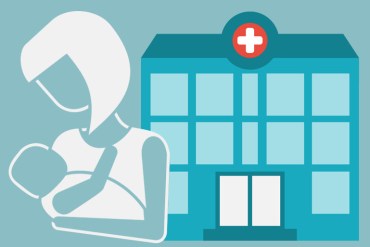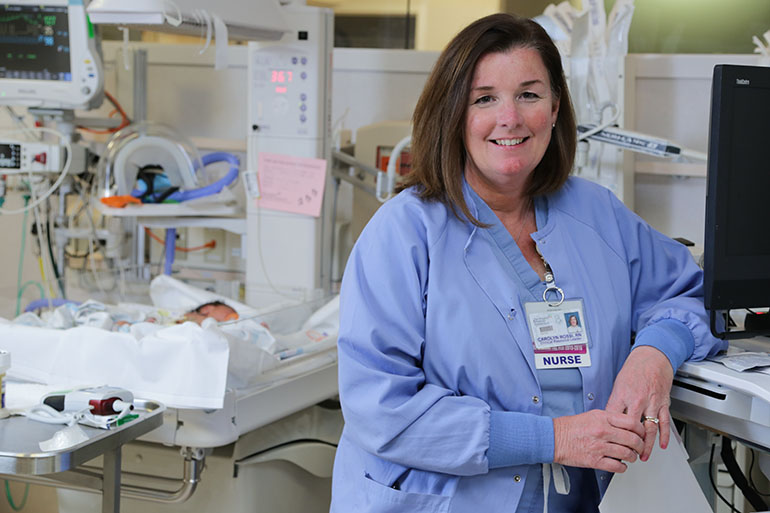HARTFORD, Conn. — Carolyn Rossi has been a nurse for 27 years, and she’s been fiercely protective of infants in her intensive care unit — babies born too soon, babies born with defects and, increasingly, babies born dependent on opioids.
Rossi works in the neonatal intensive care unit (NICU) at the Hospital of Central Connecticut near Hartford. Like many hospitals across the country, it has seen the number of babies born with neonatal abstinence syndrome go up dramatically in recent years. The National Institute of Drug Abuse reports more than 21,000 infants in the U.S. were born in withdrawal from opioids in 2012, the most recent year for which data are available. The hospital says each baby costs roughly $50,000 to treat.
These fragile and fitful babies present new challenges for hospitals. There’s research that suggests they may do best when they can be held for hours, by their mothers, in a quiet, private room as they go through the process of being weaned off the drugs. But delivering that care means changing hospital systems and attitudes about addiction among doctors and nurses.
“It was a lot about taking babies away from moms,” Rossi said, describing the way she first learned to care for babies in withdrawal. The nurses saw their role, she said, as “trying to protect the baby from the mother, basically. Like we were going to cure the baby but not cure the mother and the family.”
It wasn’t the best strategy. The babies can often be soothed best by their mothers. But mothers are struggling, too.
“So, [a mother] comes in with a stigma,” said Kate Sims, who directs the hospital’s women and children’s services. “She’s feeling guilt herself. And unfortunately, as best as we are as providers and nurses, we’re also judgmental.”
Sims said that feeling — that lack of trust between a mother and a nurse — can push that mom away, making treating the baby even harder.
So the hospital has started to retrain its nurses to think differently. The biggest change? Treating mom as a mom, and not as an addict. That means recognizing that addiction isn’t a moral failure, and that many people who are addicted come from a lifetime of trauma. Rossi said it’s been hard for nurses who are baby specialists to be mom specialists, too.
“It’s a big culture change for me personally, and I know for the NICU nurses that are in here. You really do believe you’re doing the right thing until something like this comes along.”
Along with changing a culture of nursing, it’s changing a hospital’s approach, too. Dr. Annmarie Golioto, chief of pediatrics and the head of the hospital’s nursery, says a bright, loud, bustling intensive care unit is a hard environment for a baby going through withdrawal. So she’s gotten approval to use a few rooms just outside the intensive care unit — quiet, monitored spaces for the baby and mother to stay for as long as the baby needs it.
“We’ve had to figure out, how can we use our rooms differently?” says Golioto. “How can we use our space differently? And how we can partner with mom differently to have that relationship with her to say, ‘We expect you to stay here with your baby and take care of the baby after you’ve been discharged.'”
Golioto hopes the new setting could shorten recovery times and decrease the amount of morphine a baby needs to ease withdrawal. She’s also hopeful these moves will inspire some mothers to think differently about their newborns.
 “The thinking was, ‘My baby is being taken care of. There are nurses there. There are doctors there. I don’t need to be here. They’re getting everything they need,’ ” says Golioto. “What we’re trying to change the thinking is, ‘No, they’re not getting everything they need if you’re not here. Because they need you.’ ”
“The thinking was, ‘My baby is being taken care of. There are nurses there. There are doctors there. I don’t need to be here. They’re getting everything they need,’ ” says Golioto. “What we’re trying to change the thinking is, ‘No, they’re not getting everything they need if you’re not here. Because they need you.’ ”
Nurse Rossi says she only needed to see the change in attitude and approach work once to see the culture shift pay off. It was back in December, and she gave a mother a room to stay in for more than a month while her baby went through withdrawal.
“She was just thrilled. And she wasn’t here 24/7. She couldn’t be here 24/7,” says Rossi. “She was here as much as she could and, just knowing that she had the flexibility, for me, helped me understand that she is a mom, she is a great mom, she wants to be a better mom.”
Nearly every aspect of the opioid epidemic worsened in 2014, according to the government’s latest figures. And even though this hospital’s programs are just a few months old, it’s hoping that this culture change will, at the very least, give at risk moms and babies a better start.
This story is the second in our four-part series, “Treating the Tiniest Opioid Patients,” a collaboration produced by Kaiser Health News, NPR and local NPR member stations.








